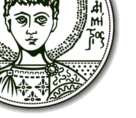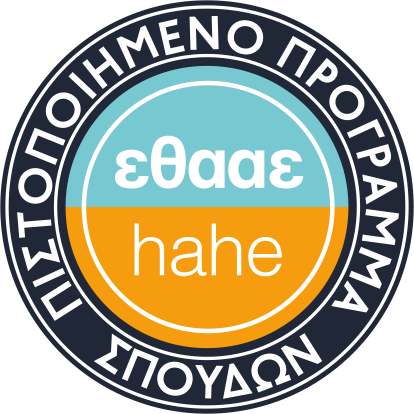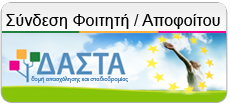Karakasis Evangelos
Evangelos Karakasis graduated the Division of Classics at the Department of Philology of Ioannina University (1991), holds an MPhil in Classics from the University of Cambridge (Pembroke College) and his PhD from the same University and College (2001). He has served and taught at the University of Cambridge, at the Aristotle University of Thessaloniki, at the University of Ioannina, while since 13.02.2020 he has been appointed as a Professor of Ancient Greek and Latin at the Department of Philology of Aristotle University of Thessaloniki.
Evangelos Karakasis' research interests focus on Latin and Ancient Greek literature, mainly their interaction as a means of producing meaning. More specifically, his research interests include: Roman Comedy, Roman Bucolic Poetry, Literature of the Neronian Period, History of Latin, The Epic of the Flavian Era, The Reception of Roman Comedyby Medieval Latin, Greek Literature of the Imperial Times. He has taught all the above-mentioned subjects, has written books and / or articles with the above-mentioned topics and has participated in various conferences with relevant paqpers. In the field of Ancient Greek Literature, in addition to his main involvement with the Greek literature of the Roman rule, his books also include independent chapters on Greek New Comedy (mainly Menander), Greek bucolic poetry (Theocritus , Moschus, Bion and the post-theocriticean, in general, development of the pastoral trope in Greek literature). He also studies the didactics and the history of the teaching of Latin in the Greek secondary education and, therefore, he was the Organizer and the Scientific Responsible of the Conference entitled: ‘Docere et Discere…! Latin in Education. Reviews - Proposals – Perspectives’ under the auspices of the Dean at the Facultyof Philosophy of Ioannina University (17.05.2017).
Research interests:
Roman Comedy, Roman Bucolic Poetry, Literature of the Neronian Period, History of the Latin Language, Epic of the Flavian Era, Reception of Roman Comedy by Medieval Latin Literature, Greek Literature of Imperial Rome.
Studies:
- University of Ioannina – BA in Philology with honours in Classics. Grade: Excellent (9.15), 1991–5
- University of Cambridge - Pembroke College - MPhil in Classics, 1996–7 . Supervisor: Prof. M. D. Reeve. Grade: First Class
- University of Cambridge - Pembroke College - PhD, 1997–2001. Supervisor: Prof. R. L. Hunter.
Academic Career:
- University of Ioannina – Temporary Instructor of Latin, 2002–4
- Aristotle University of Thessaloniki - Lecturer in Latin. March 2011–02-06-2015
- University of Ioannina - Assistant Professor of Latin. 03-06-2015
- University of Ioannina - Associate Professor of Latin. 12.01.2020
- Aristotle University of Thessaloniki, - During the spring semester of the academic years 2015-6, 2016-7, 2017-8, 2018-9 I taught, as a temporary instructor (IDOX), in the Department of Philology of the Aristotle University of Thessaloniki, courses in Latin Philology
- Higher Ecclesiastical School of Vella, Ioannina, - During the year 2018-9 and the winter semester of 2019-20, I taught Ancient Greek and Latin Language and Literature.
- Aristotle University of Thessaloniki - Professor of Ancient Greek and Latin Philology. 13.01.2020 – today
Teaching:
Roman Rhetoric – Oratory (Cicero: Pro. T. Annio Milone), Roman Historiography (Sallust: De Coniuratione Catilinae, Anthology of Roman Historiography and Biography), Roman Elegy (Tibullus, Propertius, Ovid Amores), Roman Comedy (Terence: Adelphoe , Eunuchus), Roman Tragedy (Seneca: Phaedra), Roman Lyric Poetry (Catullus), Roman Bucolic Poetry (Vergil: Eclogues, Calpurnius Siculus, Einsiedeln Eclogues, Nemesianus), Roman Epic (Valerius Flaccus, Statius Silius Italicus), Roman Epigram (Martial), History of Latin Literature, Latin Unseen, Latin Language Consolidation (Reverse translation), Literary Criticism in Greece and Rome, Greek authors of the imperial period, Christian authors of the early antiquity (St. Basil the Great, etc.).
Publications:
Books:
1. Terence and the Language of Roman Comedy, Cambridge University Press (CUP), Cambridge 2005 (hardcover), 2008 (softcover).
2. Song Exchange in Roman Pastoral, De Gruyter - Trends in Classics Supplementary Volumes 5, Berlin and New York, 2011.
3. T. Calpurnius Siculus: A Pastoral Poet in Neronian Rome, De Gruyter - Trends in Classics Supplementary Volumes 35, Berlin and Boston, 2016.
4. Cicero: Pro. T. Annio Milone, Carpe Diem, Athens, Ioannina 2019.
5. An Anthology of Post-Calpurnian Pastoral, Cambridge Greek and Latin Classics (under publication).
6. Polybius Histories 1st Book, Carpe Diem, Athens, Ioannina (forthcoming).
Editing of Collective Volumes:
1. E. Karakasis (ed.), Singing in the Shadow… Pastoral Encounters in Post – Vergilian Poetry (TCS 4.1), Berlin and New York, 2012.
2. (with Prof. I.N. Perysinakis, ed.), Plautine Trends: Studies in Plautine Comedy and its Reception, De Gruyter - Trends in Classics Supplementary Volumes 29, Berlin and Boston, 2014.
Articles in Periodicals, Electronic Databases and Collective Volumes:
1. ‘Quantum mutatus ab illo: Terence in Hroswitha’, Hellenica 52 (2002), 279–93.
2. ‘A Reading of the Introductory Scene of Terence’s Heautontimorumenos’, Dodone: Philology 31 (2002), 247–62.
3. ‘Legal Language in Plautus with Special Reference to Trinummus’, Mnemosyne 15 (2003), 47–67.
4. ‘Language and Plot in Plautus’ Bacchides ’, RCCM 50 (2003), 169–83.
5. ‘A Note on Terentian Meter’, MD 52 (2003), 194–20.
6. ‘Totum ut te faciant, Fabulle, nasum: Catullus’ XIII Reconsidered ’, Studies in Latin Literature and Roman History 12 (2005), 97–114.
7. ‘Generic Consciousness and Diction in Ovid: A Reading of Amores III.1’, RFIC 138 (2010), 128–42.
8. ‘The (Singing) Game is not Afoot’ - Calpurnius Siculus ‘Sixth Eclogue’, TCS 2.1 (2010), 175–206.
9. ‘Terence: Phormio’, The Literary Encyclopedia, 1–7. Uploaded on August 1, 2011, http: //www.litencyc. com / php / sworks.php? rec = true & UID = 13477
10. 'The Poetics of Latin didaxis: A Reading of Calpurnius Siculus' Fifth Eclogue', (id.) Singing in the Shado w… Pastoral Encounters in Post –Vergilian Poetry (TCS 4.1), Berlin and New York (2012), 153 –96.
11. 11. ‘Αποχαιρετώντας το Βουκολικό Είδος. Ο Καλπούρνιος Σικελός και η Έβδομη Εκλογή του’, D. Z. Nikitas (ed.), Laus et Gratia in memoriam Konstantinos Grolliou, Thessaloniki (2012), 23 –38.
12. ''Petronian Gigolo ': Encolpius'' Dysfunction 'Revisited', Harrison, SJ and Frangoulidis, S. (eds.), Narrative, Culture and Genre in the Ancient Novel (TCS 4.2), Berlin and New York (2012) , 316 –37.
13. ‘Masters and Slaves’, Augoustakis, A. - Traill, A. (eds.), Blackwell Companion to Terence, Malden, Oxford, Chichester (2013), 211–22.
14. ‘Comedy and Elegy in Calpurnian Pastoral:‘ Generic Interplays ’in Calp. 3 ', Papanghelis, T. D., Harrison, S. J. and Frangoulidis, S. (eds.), Generic Interfaces in Latin Literature. Encounters, Interactions and Transformations, Berlin and New York (2013), 231–64.
15. ‘Βουκολική Ποιητική και Πανηγυρική Ρητορική στα Χρόνια του Νέρωνα: Ποιμενική Παράδοση και Νεοτερικότητα στην Πρώτη Εκλογή του Καλπουρνίου του Σικελού’, Dodone Philology 42 (2013), 468–513.
16. ‘Η Παρουσία του Δούλου Σύρου στην Κωμωδία του Τερεντίου Αδελφοί: Προσπάθειες Εκρωμαϊσμού’, Proceedings of the 5th Panhellenic Symposium on Latin Studies - Multiculturalism in Rome, Social and Political Life, Komotini - 2–5 May 2007, Athens (2013), 172–82.
17. ‘Calpurnius Siculus’, The Literary Encyclopedia, 1–9. Uploaded on August 29, 2013, http: //www.litencyc. com / php / speople.php? rec = true & UID = 13117
18. The Language of the Palliata’, Fontaine, M. - Scafuro, A. (eds.), The Oxford Handbook of Greek and Roman Comedy, Oxford (2014), 555–79.
19. ‘ Homeric Receptions ’in Flavian Epic: Intertextual Characterization in Silius Italicus’ Seventh Book of the Punica ’, Augoustakis, A. (ed.), Flavian Literature and its Greek Past, Leiden (2014), 251–66.
20. ‘Tragic and Epic Interactions in Terentian Comedy’, Papaioannou, S. (ed.), Terence and Interpretation, Newcastle (2014), 75–93.
21. ‘Introduction’, Perysinakis, I.N. and Karakasis, E. (eds.), Plautine Trends: Studies in Plautine Comedy and its Reception, Berlin and Boston (2014), XIII – XXI.
22. ‘Cicero Comicus - Catullus Plautinus; Irony and Praise in Cat. 49’, Perysinakis, I.N. and Karakasis, E. (eds.), Plautine Trends: Studies in Plautine Comedy and its Reception, Berlin and Boston (2014), 195–221.
23. ‘moras soluit belli: O Καίσαρας του Λουκανού στον Ρουβίκωνα (B.C. 1.183-227)’, Dodone Philology, 2016.
24. ‘Petronian Spectacles: The Widow of Ephesus Generically Revisited’, Frangoulidis S., Harrison S. J και Manuwald, G (εκδ.), Roman Drama and its Contexts, Berlin (2016), 505-31.
25. «Τα Λατινικά Γράμματα στο ελληνικό σχολείο: πορεία μέσα στο χρόνο», Dodone Philology: 2017, 42-44, 289-304.
26 ‘Silius Italicus and Polybius: Quellenforschung and Silian Poetics’, Miltsios, N. and Tamiolaki, M. (eds.), Polybius and his Legacy, Berlin and Boston, 2018, 401-16.
27. ‘Lucan’s Intra / Inter-textual Poetics: Deconstructing Caesar in Lucan’, Harrison S. J, Frangoulidis S. and Papanghelis, T. D. (eds.), Intratextuality and Latin Literature, Berlin and Boston, 2018, 353-76.
28. «Η Ρωμαϊκή κωμωδία και η ποιητική της "αγάπης"», Scientific Yearbook of Vella 8, issue 1, 463-484
29. ‘The Language of Roman Comedy’, Martin, D. (eds.), Cambridge Companion to Roman Comedy, CUP, 2019, 151-70.
30. ‘Carmina Einsiedlensia’, The Literary Encyclopedia (forthcoming).
31. ‘Theocritus in Post-Vergilian Pastoral’, Kyriakou, P., Rengakos, A., Sistakou E (eds), Brill’s Companion to Theocritus (forthcoming).
32. ‘Homer, Lucian, and Quintus of Smyrna: an unnoticed intertext and the presentation of Helen’, MChr. (forthcoming).
Translations:
1. In collaboration with I. Manolessou, D. Koukouzika and P. Seranis, K. Bartels, Was ist der Mensch? Texte zur Anthropologie der Antike, Munich 1975 (Exantas)
2. T. Whitmarsh, The Second Sophistic, Cambridge 2005 (Daedalus - Zacharopoulos, Athens - 2013).
3. In collaboration with E. Peraki-Kyriakidou, R. Maltby and K. Belcher, Wiley’s Real Latin. Learning Latin from the Source, Malden, Oxford, Chichester 2014 (Smili, Athens 2018).
4. In collaboration with Th. Papadopoulou editing of the translation and translation of the Greek and Latin quotes from S. J. Harrison, Horace (New Surveys in the Classics), 2004 (University Studio Press, Thessaloniki, 2019).
Lexicography:
Entries (M-Na) in Nikitas, D. - Tromaras, L. (eds.), Latin-Greek Dictionary (University Studio Press, Thessaloniki 2019).
Reviews:
1.HELENE PERDICOYIANNI-PALEOLOGOU: ANAPHORE, CATAPHORE ET DEIXIS CHEZ PLAUTE: LES EMPLOIS DE IS, HIC, ISTE, ILLE. Leuven – Paris – Walpole, MA: Peeters, Orbis Supplementa 38, 2013; JRS 105, 2015, 446-7.
2. M. A. VINCHESI: CALPURNII SICULI, ECLOGAE. Florence: Felice Le Monnier, Biblioteca Nazionale. Serie dei classici greci e latini. Testi con commento filologico, IX, 2014; GNOMON 89.7, 2017, 659-60.
3. Peter Barrios-Lech, Linguistic Interaction in Roman Comedy. Cambridge; New York: Cambridge University Press, 2016, CR (forthcoming).
Organization of workshops-conferences:
1. Organizer and Scientific Responsible of the Conference entitled: ‘Docere et Discere…! Latin in Education. Reviews - Proposals - Perspectives under the auspices of the Dean of the Faculty of Philosophy of Ioannina University. (17.05.2017).
2. Member of the organizing committee (treasurer) of the 10th Panhellenic Symposium on Latin Studies on ‘Religion and Mythology in the Roman World’, 2-4 September 2020.


